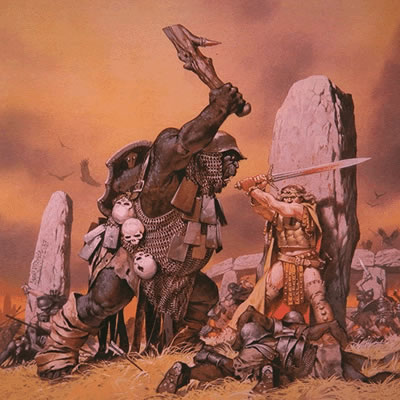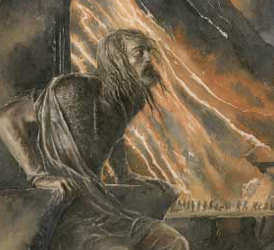Hurin the Steadfast: Part One of “The Wanderings of Hurin”
Wednesday, May 20, 2009
posted by Deuce Richardson
 Print This Post
Print This Post

Part Three: The Long Road to Menegroth
My esteemed colleague, Brian Murphy, recently reviewed The Children of Húrin, so it seemed apposite to follow that with an account of what transpired after the death of Nienor and Túrin. Both died that fateful day above Cabed Naeramarth, but their parents, Morwen and Húrin, lived on. The curse of Morgoth upon the House of Húrin had yet to come to full fruition.
The tale of Húrin’s wanderings has come down to us, primarily, in one volume, The War of the Jewels: The Later Silmarillion, edited by Christopher Tolkien. Christopher Tolkien traces the evolution of the saga from the “lost continuation” of “The Grey Annals” (an account of the First Age written by JRRT in the early 1950s) to a “substantial complex of writing” which seems to have been composed in the latter half of that decade. The title that the elder Tolkien settled upon was “The Wanderings of Húrin.” All of this “substantial complex of writing” was in service of fleshing out the stories (he did the same, or began to, for his tales of Túrin and Tuor) that Tolkien had first envisioned in the ’20s and ’30s, fresh from the horrors of the Great War.
Tolkien, after the completion of his novel, The Lord of the Rings, went back to The Silmarillion with the intention of expanding it and bringing it into closer accord with his tale of the Fall of Sauron, which was, in many ways, an addendum and afterthought to the previous work. Tolkien had always intended to see The Silmarillion published, and in fact, he had submitted it to a befuddled Unwin-Ryan immediately after the unexpected world-wide success of The Hobbit. “The Wanderings of Húrin” was to play a pivotal part in Tolkien’s projected revision and expansion of The Silmarillion.
“The Wanderings of Húrin” is not The Hobbit. One tale was written (spoken, actually) in the early ’30s by JRRT to entertain his children, Christopher Tolkien chief amongst them. The other was begun by Tolkien in the late 1950s, when he saw “double-speak” (a term Orwell didn’t invent, but should have) and an Iron Curtain, with its attendant gulags (how different were Morgoth’s “Hells of Iron,” really?), spreading their influence across his world.
I will not go into the complexities regarding the composition of “Wanderings” here, other than to say Christopher Tolkien noted that his father, fairly early in the narrative, “came to a clearer understanding” of how things stood in Brethil when Húrin the Steadfast appeared at its borders with vindication and vengeance in his mind. As events would show, the shadow of Angband hung close about him.
Knowing what sorrows and horrors befell the eldest son of Galdor in the preceding six decades might allow the unitiated to better appreciate Húrin’s mind-set.
By all accounts, Húrin Thalion was “the mightiest of the warriors of mortal Men.” Not just of the First Age. Ever. His son, Túrin Turambar, killed the Grandfather of All Dragons, Glaurung. Túrin was merely the mighty son of a mightier father.
In his youth, Húrin, along with his younger brother, Huor, after a bloody battle against the forces of Morgoth, was granted entrance to the hidden kingdom of Gondolin, where Turgon, son of Fingolfin, ruled. The sons of Galdor wished to return to fight beside their kindred, so Turgon went back upon his policy of never letting any who knew of his kingdom return to the outside world. This was to have profound consequences, for both good and ill.
Húrin went on to be a lord in Hithlum and marry Morwen Edhelwen. Their first daughter, Lalaith, died of a plague “out of Angband,” long before Conan and the Midnight God was ever written. Húrin turned toward Angband and cried out his wish to meet Morgoth “face to face.” His wish would be granted, tragically.
Years later, when came the Battle of Nirnaeth Arnoediad, it was Húrin and Huor, along with their men of Hithlum, who stood at the Fens of Serech and allowed Turgon’s forces to retreat. Huor died with an orc-arrow in his eye, much like Harold Godwinson at Hastings. All others fell, save Húrin. He cried, “Aure entuluva! Day shall come again!” seventy times before the minions of Angband pulled him down by sheer numbers. It fell to Gothmog, Lord of Balrogs, to bind him.
Gothmog dragged Húrin before Morgoth. Morgoth, in all respects, was the “Satan” of Tolkien’s Middle-Earth, the “Lord of This World,” with all of the temporal power and supernatural guile that implies. Morgoth wanted to know where Gondolin, a hidden and unassailable thorn in his side, was located. Morgoth was aware that Húrin “had the friendship of the king of Gondolin; but Hurin defied him, and mocked him.” Húrin “resisted the Devil” (see James 4:7), but the Devil did not flee.
Then Morgoth cursed Húrin and Morwen and their offspring, and set a doom upon them of darkness and sorrow; and taking Húrin from prison he set him in a chair of stone upon a high place of Thangorodrim (the mountains within which Angband was delved). There he bound him by the power of Morgoth, and Morgoth standing beside him cursed him again; and he said: ‘Sit now there; and look out upon the lands where evil and despair shall come upon those whom thou lovest. Thou hast dared to mock me, and to question the power of Melkor, Master of the fates of Arda (Middle-Earth). Therefore with my eyes thou shalt see, and with my ears thou shalt hear; and never shalt thou move from this place until all is fulfilled unto its bitter end.’
And even so it came to pass; but it is not said that Húrin asked ever of Morgoth either mercy or death, for himself or any of his kin.
From The Silmarillion by JRR Tolkien

This is not Conan, king of Aquilonia, telling Amalrus, Strabonus and Tsotha-Lanti to go to Hell. This is Hurin, face to face with the “Devil,” chained in a literal, Middle-Earthly “Hell.” Job would feel lucky next to Hurin. Of all the Edain (the Men allied with the Elves), Húrin “knew most of the counsels of (the Elves).” There would be no doubt in his mind of the surpassing power and evil of Morgoth, once called Melkor. His was not the ignorance of Conan upon first meeting Xaltotun. The son of Galdor knew that he must abandon all hope, yet he never wavered; not once did he ask even the mercy of death from the hand of Morgoth.
I think it’s safe to say that most of those who have viewed Kubrick’s A Clockwork Orange have felt a twinge of sympathy for Alex DeLarge when he is forced to watch hours of horrific footage , despite the fact that he definitely “had it coming” (and, literally, “asked for it”). Alex watched those horrific scenes for hours over the course of a couple of weeks. Imagine the torment of Húrin, forced to observe the unfolding of Morgoth’s curse upon all of those he loved the most. Húrin saw it all. Twenty-eight years of it. Every tragic scene filtered through the twisted perspective of Morgoth. Lewis’ The Screwtape Letters (dedicated to Tolkien) merely dips its toe into the murky waters of the Evil One’s machinations compared to the wiles worked upon Hurin Thalion. Is it any wonder that Húrin left Angband with a Shadow upon his heart?
Next… Part Two: ‘Tôl acharn!’
